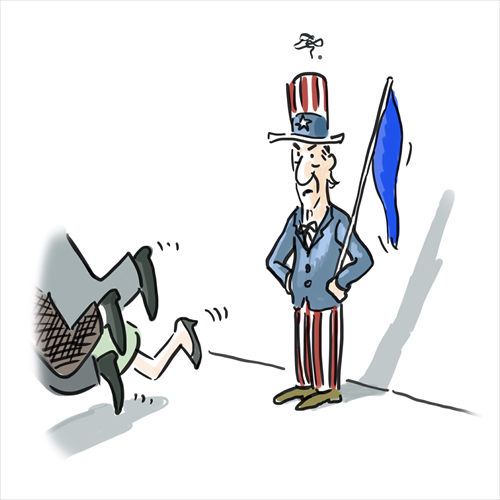Britain ignores shortsighted US objections by joining AIIB

Illustration: Liu Rui/GT
The growing role of China in the world economy is unquestionable. Its attempt to support infrastructure not only within the country but also in the context of the "One Belt, One Road" is also clear. In that regard, the creation of the Asian Infrastructure Investment Bank (AIIB) constitutes an indicative initiative. Specifically, 21 Asian countries signed an initial agreement last October seeking to promote regional development and foster cooperation. The expected initial subscripted capital will be $50 billion with China having the lion's share.
From the very first beginning, the US has perceived the potential creation of the AIIB in a suspicious and negative way. In October 2014, for instance, The New York Times reported that US officials were lobbying against the project. In the US view, China's alleged objective is to undermine the World Bank and the Asian Development Bank. Washington sees Beijing as challenging the US supremacy in financial organizations established after WWII.
Apart from the initial US reaction, the AIIB attracts again attention these days.
That is because of a decision made not by an Asian country but by a European one, Britain, to join the bank and become one of its shareholders. In particular, Britain considers this decision as being placed within its national interest. But the US does not seem to agree. As a US official told the Financial Times, "We are wary about a trend toward constant accommodation of China, which is not the best way to engage a rising power."
Additionally, the US endeavors to put pressure on Britain and ensure that high standards of governance will be upheld in the AIIB following the model of the World Bank. For its part, China has responded that the new bank will draw on experiences from other multilateral development banks and avoid their detours. In any case, the general approach of the US remains problematic.
Thomas Wright from the Brookings Institution, for example, regards it as "confused and contradictory." The Economist goes even further and argues that "it is perhaps understandable that China, flush with the world's biggest foreign-exchange reserves and anxious to convert them into soft power, is building an alternative system."
By deciding to join the AIIB, London has openly demonstrated the emphasis it puts on the economic parameter of its relations with Beijing. After experiencing practical benefits in previous years, it is now prepared to give a new momentum to the Sino-British partnership.
In the view of British Finance Minister George Osborne, "forging links between the UK and Asian economies to give our companies the best opportunity to work and invest in the world's fastest growing markets is a key part of our long-term economic plan."
Britain's move shows that it can further develop its cooperation with China without being restricted by the "special relationship" with the US. This "special relationship" does not entail that London should always follow Washington's pattern in foreign and economic policy. It is not the first time this has happened during the administration of Prime Minister David Cameron. In August 2013, for instance, Britain rejected the use of force against Syrian leader Bashar al-Assad proposed by the US.
On a different note of course the current decision of the country to join the AIIB might cause frustration in the US, but it is not sufficient to critically reshape its "special relationship" with the US.
Nonetheless, the case of Britain might be a beacon for other European countries which see their future interconnected with the Asian economy. Other European countries such as Germany, France and Italy have followed suit.
The author is a lecturer at the European Institute in Nice, France. opinion@globaltimes.com.cn